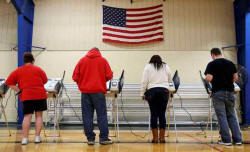|
Trump won with lowest
minority vote in decades, fueling divisions
 Send a link to a friend
Send a link to a friend
 [November 23, 2016]
By Peter Eisler [November 23, 2016]
By Peter Eisler
WASHINGTON
(Reuters) - Donald Trump won the U.S. presidency with less support from
black and Hispanic voters than any president in at least 40 years, a
Reuters review of polling data shows, highlighting deep national
divisions that have fueled incidents of racial and political
confrontation.
Trump was elected with 8 percent of the black vote, 28 percent of the
Hispanic vote and 27 percent of the Asian-American vote, according to
the Reuters/Ipsos Election Day poll.
Among black voters, his showing was comparable to the 9 percent captured
by George W. Bush in 2000 and Ronald Reagan in 1984. But Bush and Reagan
both did far better with Hispanic voters, capturing 35 percent and 34
percent, respectively, according to exit polling data compiled by the
non-partisan Roper Center for Public Opinion Research.
And Trump’s performance among Asian-Americans was the worst of any
winning presidential candidate since tracking of that demographic began
in 1992.

The racial polarization behind Trump’s victory has helped set the stage
for tensions that have surfaced repeatedly since the election, in white
supremacist victory celebrations, in anti-Trump protests and civil
rights rallies, and in hundreds of racist, xenophobic and anti-Semitic
hate crimes documented by the Southern Poverty Law Center (SPLC), which
tracks extremist movements. The SPLC reports there were 701 incidents of
“hateful harassment and intimidation” between the day following the Nov.
8 election and Nov. 16, with a spike in such incidents in the immediate
wake of the vote.
Signs point to an ongoing atmosphere of confrontation.
The Loyal White Knights of the Ku Klux Klan, a white separatist group
that vilifies African-Americans, Jews and other minorities, plans an
unusual Dec. 3 rally in North Carolina to celebrate Trump’s victory.
Left-wing and anarchist groups have called for organized protests to
disrupt the president-elect’s Jan. 20 inauguration. And a “Women’s March
on Washington,” scheduled for the following day, is expected to draw
hundreds of thousands to protest Trump’s presidency.
American politics became increasingly racialized through President
Barack Obama’s two terms, “but there was an attempt across the board,
across the parties, to keep those tensions under the surface,” says
Jamila Michener, an assistant professor of government at Cornell
University.
Trump’s anti-immigrant, anti-Muslim rhetoric “brought those divisions to
the fore; it activated people on the right, who felt empowered, and it
activated people on the left, who saw it as a threat,” she added.

That dynamic was evident last week.
When Vice President-elect Mike Pence attended the Broadway musical
“Hamilton” in New York on Friday, the multi-ethnic cast closed with a
statement expressing fears of a Trump presidency. A far different view
was on display the next day as a crowd of about 275 people cheered
Trump’s election at a Washington conference of the National Policy
Institute, a white nationalist group with a strong anti-Semitic beliefs.
“We willed Donald Trump into office; we made this dream our reality,”
NPI President Richard Spencer said. After outlining a vision of America
as “a white country designed for ourselves and our posterity,” he closed
with, “Hail Trump! Hail our people! Hail victory!”
DIVISION BREEDS CONFRONTATION
Though Trump’s election victory was driven by white voters, his
performance even among that group was not as strong as some of his
predecessors. Reagan and George H.W. Bush both won the presidency with
higher shares of the white vote than the 55 percent that Trump achieved.
[to top of second column] |

Voters cast their votes during the U.S. presidential election in
Elyria, Ohio, U.S. November 8, 2016. REUTERS/Aaron Josefczyk/File
Photo

The historical voting patterns reflect decades of polarization in
American politics, but the division surrounding Trump appears more
profound, says Cas Mudde, an associate professor specializing in
political extremism at the University of Georgia. These days, he adds,
“people say they don’t want their children even to date someone from the
other party.”
Indeed, voters’ opinions of those on the opposite side of the partisan
divide have reached historic lows. Surveys by the Pew Research Center
showed this year that majorities of both parties held “very unfavorable”
views of the other party – a first since the center first measured such
sentiment in 1992.
And the lion’s share of those people believe the opposing party’s
policies “are so misguided that they threaten the nation’s well-being,”
the center found.
That level of division has spurred activists on both sides of the
political divide to take their activism in a more confrontational
direction.
In the wake of Trump’s victory, protesters on the left took to the
streets by the thousands in cities across the country, in some cases
causing property damage.

Much of the agitation was motivated by a belief that Trump’s
administration will foster racism and push the courts and other
political institutions to disenfranchise minority voters, says James
Anderson, editor of ItsGoingDown.Org, an anarchist website that has
promoted mass demonstrations against Trump’s presidency, including a
call to disrupt his inauguration.
Many on the left have come to distrust government institutions,
embracing a breed of activism aimed at directly confronting what they
see as condemnable political forces, Anderson says. “The answer now is
to organize, build power and autonomy and fight back.”
On the opposite end of the political spectrum, Trump’s election is
bringing new hope for right-wing activists who felt abandoned by the
major parties.
John Roberts, a top officer in the Ku Klux Klan affiliate planning the
December rally to celebrate Trump’s election, says the group is
committed to non-violent demonstrations, but he sees Trump’s election as
likely to bring a new era of political conflict. And much of the strife,
he says, will be centered around racial divisions.
“Once Trump officially takes office, there is going to be a boiling over
at some point in time,” Roberts says. “Who knows when that’s going to
be, but it’s not going to be pretty.”
(Additional reporting by Chris Kahn in New York. Editing by Stuart
Grudgings)
[© 2016 Thomson Reuters. All rights
reserved.] Copyright 2016 Reuters. All rights reserved. This material may not be published,
broadcast, rewritten or redistributed.

 |